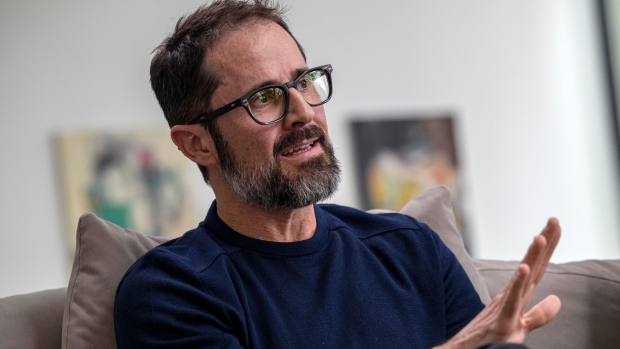Jun 8, 2023
Twitter Co-Founder Williams Says He Was ‘Sad’ After Musk's Purchase
, Bloomberg News

(Bloomberg) -- Twitter co-founder Evan Williams, who watched Elon Musk’s advances on the company in 2022 with great interest, was “sad when the purchase actually went through,” he said.
Williams, in his first interview since Musk took Twitter private, said he initially thought the takeover idea was “interesting and fun,” but didn’t expect it to actually happen. Now Williams is no longer a Twitter shareholder, he said on the new Bloomberg Originals series, “The Circuit with Emily Chang.” As for Musk, “I don’t think he’s dialed it in quite right yet,” Williams said. “I think he’s brilliant. But no one’s brilliant on everything.”
Williams has tweeted sparingly since Musk’s takeover, and said little about the deal-or-no-deal rollercoaster and ensuing drama. He was joined on “The Circuit,” which premieres Thursday at 10 p.m. New York time on Bloomberg Television, by Jason Goldman, one of the earliest members of Twitter’s founding team, whose views are more scathing.
“It’s gone pretty poorly, I mean just objectively speaking,” Goldman said. He lambasted Musk’s approaches on issues like bots and “culture wars” as “lightly considered” and geared more towards its new owner’s personal preferences rather than what’s best for a global service.
Both Williams and Goldman believe Twitter, long criticized for not innovating fast enough or making enough money, was on an upward trajectory under its prior leadership. The company had invested heavily in safety and reports of abusive content had declined. In its last earnings report as a public company, Twitter generated $1.18 billion in revenue but still carried a $270 million net loss. User growth seemed to have plateaued, and with an economic downturn looming, Goldman acknowledges Twitter was in a vulnerable state: “I just don’t think it had to be quite this silly.”
Since Musk took over, Twitter has lost more than half its advertising revenue as brands stopped trusting the site to remove violent, pornographic and hateful content. Twitter also shed more than 75% of its employees, through layoffs and resignations. The site has been roiled by technical difficulties, including during a recent launch of Florida Governor Ron DeSantis’ campaign for president.
Jack Dorsey, the other Twitter co-founder and its chief executive officer from 2015 to 2021, helped orchestrate Musk’s takeover and was initially supportive, calling him the “singular solution I trust” for its corporate future in an April 2022 tweet. But he has also recently soured on the purchase, and said this year that he thinks it “all went south.” When asked if Musk has been the best steward for the platform, Dorsey said “no.”
Williams, who was Twitter CEO from 2008 to 2010, said on “The Circuit” that he hasn’t spoken to Dorsey recently.
“I’m not mad at Jack,” Williams said. “I think he made a mistake….He cares so deeply… but I'm guessing it's not going the way he was hoping.”
Also on the show, several Twitter employees who witnessed Musk’s takeover shared what they experienced. “The way the layoffs were done, there was just like no grace to it,” said Sheon Han, a software engineer who resigned soon after the takeover. Another former engineer, Manu Cornet, equated the experience to a “bad Netflix series.”
Helen-Sage Lee, who was a program manager there, said she was cut off from her work on election misinformation just days before the midterms. “I cried for a solid hour,” she said. “I was grieving the loss of the job and the workplace that I actually really, really loved being a part of.”
There’s also grief that under Musk, Twitter will never be what it once was, even if it was far from perfect. “Twitter is a unique jewel on the internet and in the world, and there's nothing quite like it,” said Erik Berlin, a former engineering manager. “Having a single space where you can tweet at your congressperson and there's a good chance they'll see it and there's a chance they'll reply — That's not happening on Facebook. That's not happening on Instagram. That's not happening on TikTok.”
Musk did not respond to requests for comment. He has explained that he’s trying to bring “free speech” to Twitter — but the reality of running a network like Twitter isn’t as simple as letting everyone post, the former employees said.
“People on the outside have no idea the complexity and the thoughtfulness that goes into these decisions about what can stay on,” Williams said. “It reminds me of different metaphors that you're like hosting a party. And someone's ruining the vibe.”
Williams says there’s certainly a chance Musk succeeds at turning Twitter into a “good party,” but that “generally the new thing does not come from the old thing.” He predicts Twitter’s future could mirror Yahoo or Myspace. Though both sites still exist, their brand value has significantly declined. Twitter’s brand may be forever changed.
“I think brand recovery is much harder and now the brand is very linked to Elon,” Williams said.
At this point, Williams is questioning Twitter’s very premise. “Maybe we just had the wrong idea with Twitter, and now it's time to move on to some other idea,” he said, adding that it would be interesting to help people be more social online without consuming or creating content. “The idea of ‘social media’ is probably the thing I'm questioning the most right now.”
--With assistance from Lauren Ellis.
©2023 Bloomberg L.P.





